Uh-oh. Maybe mainstreaming and secularizing meditation and mindfulness practice has gone too far? “I AM being stalked by meditation evangelists,” complains Adam Grant in a recent Op-Ed piece for the New York Times. “They approach with the fervor of a football fan attacking a keg at a tailgate party,” he claims.
Meditation has exploded in popularity. And, the notion of “mindfulness” is ubiquitous in press pieces and book titles. A quick scan of my shelves reveal “The Mindful Leader,” “The Mindfulness Revolution,” “The Mindful Brain,” “The Miracle of Mindfulness,” and “The Power of Mindful Learning.” There is even “A Mindful Nation” by Ohio’s Congressman Tim Ryan.
Is the explosion in the popularity of meditation and the surfeit of books about mindfulness actually helping to increase mindfulness in individuals and society as a whole? The jury is still out.
My experience is that it is much easier to talk or write about mindfulness then it is to actually do it in real time. I practice mindfulness meditation. This means I sit and practice paying attention to and becoming more aware of breath, body sensations, thoughts, and emotions as they arise moment-to-moment in an accepting and non-judgmental way. (For an overview of 22 various forms of meditation visit liveanddare.com)
Meditating helps me (1) connect with myself and know what is going on “in there;” (2) notice before I go on automatic and do or say things that I later regret; (3) think more clearly and calmly; and (4) be less reactive and more resilient, less likely to get overwhelmed by life’s vicissitudes and more able to recover quickly when I do.
What this means in meetings is that I am able to treat and interact with myself and with others more consciously and compassionately. Instead of being mind-full of opinions about myself, others, or how things are “supposed to be” I am better able to be mindful of how things actually are. I am more able to notice my likes and dislikes and suspend my opinions long enough so I can make conscious choices about what I want to do and say in ways that are congruent with my intentions.
The hardest part seems to be simply being with my true experience, because thoughts and opinions come to the fore so quickly. Most of us see the world through a glass darkly because of the relentless tendency of the human brain to judge someone as good or bad, right or wrong, safe or a threat.
In meetings with colleagues at work, especially ones you have worked with over time, how open are you to who they are in this moment vs. your judgments about them from past experience? Is it possible to bring a fresh mind or perspective and really “hear” what they are saying today and understand why they are saying what they are saying? “Please tell me how you came to see it this way? What is important to you in this situation?”
Mindfulness meditation practice enables me to notice when I am about to see others from the past instead of the present; when I am about to put my judgments between me and my direct experience of them.
This is why mindfulness matters. In order for us to get from where we are to where we want to be in our communities and places of work, we need to be able to distinguish between what we are actually experiencing and our judgments about what we are experiencing. The former opens the doors to new ways forward in understanding and figuring out solutions to tough problems. The latter foments misunderstanding and conflict.
However you develop it, the key is mindfulness. I develop it by meditating. My husband develops it by walking in the forest. What’s important to developing mindfulness is being able to experience whatever you are doing when you are doing it without getting lost in judgments or opinions. As you walk, are you paying attention to the movement of the body, noticing the sensations of your feet touching the ground, and being aware of your breathing or is your mind unconsciously wandering all over the place?
Mindfulness is an essential step in learning how to talk and work better together.


2 thoughts on “Do “Meditation” and “Mindfulness” Matter?”